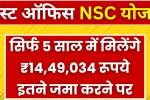In recent times, a viral message has been circulating claiming that by investing just ₹3,000 per month in a Postal Life Insurance (PLI) plan, one can receive a whopping ₹43 lakh at maturity. But is this claim actually true? Or is it misleading marketing?
In this blog, we decode the real details behind the PLI scheme, understand the type of plans available, and calculate whether such returns are really possible. Read till the end for a detailed, transparent analysis.
📬 What is Postal Life Insurance (PLI)?
Postal Life Insurance is one of the oldest and most trusted life insurance schemes in India, launched in 1884. It is offered by the Department of Posts (India Post), under the Ministry of Communications, and caters mainly to:
- Government employees
- Employees of public sector undertakings (PSUs)
- Employees of nationalized banks
- Professionals like doctors, engineers, lawyers, teachers, etc.
Recently, PLI coverage has been extended to employees of private institutions, including micro-finance and cooperative societies.
🔍 Key Features of PLI
- High returns with low premium
- Government-backed security
- Loan facility available after 3 years
- Bonus declared every year
- Tax benefits under 80C and 10(10D)
- Available at all post offices across India
📑 Types of PLI Schemes
Here are the major Postal Life Insurance policies available in 2025:
| Plan Name | Type | Suitable For |
|---|---|---|
| Santosh Plan (Whole Life) | Long-term protection | Young professionals, early planners |
| Suraksha Plan (Endowment) | Risk + savings | Retirement planning |
| Suvidha (Convertible Whole Life) | Flexibility of conversion | Long-term with switching option |
| Sumangal (Money-Back) | Periodic payouts | Short- and medium-term needs |
| Yugal Suraksha (Joint Life) | Joint coverage (spouse) | Married couples |
| Bal Jeevan Bima | Child insurance | Government employees with children |
💡 The Claim: ₹3,000 per month = ₹43 Lakh?
Let’s break down the viral claim:
- Monthly premium: ₹3,000
- Yearly premium: ₹36,000
- Policy term: 30 years
- Assumed returns: ₹43,00,000
Now, let’s calculate the actual maturity value under a typical PLI Endowment Plan (Suraksha) with a 30-year term, using the bonus rates from 2024-25, which were:
- ₹58 per ₹1,000 sum assured per year for endowment plans
📈 Sample Calculation: Is ₹43 Lakh Possible?
Let’s assume:
- Monthly investment: ₹3,000
- Annual premium: ₹36,000
- Sum Assured: Approx. ₹10 lakh
- Term: 30 years
- Bonus: ₹58 per ₹1,000 per year
🔹 Bonus Calculation:
- ₹58 × 10,000 = ₹5,80,000 bonus over 30 years
- Sum Assured: ₹10,00,000
- Total maturity: ₹10,00,000 + ₹5,80,000 = ₹15,80,000
This is far less than ₹43 lakh, even with long-term compounding. So clearly, the ₹43 lakh claim is not realistic under standard bonus rates.
🧠 Why Such Claims Are Misleading
- People assume very high bonus rates or returns like market-linked plans, which PLI does not offer.
- PLI is a conservative, low-risk, bonus-based scheme, not a mutual fund or equity-linked plan.
- The ₹43 lakh figure may only be possible if:
- You invest ₹3,000 in multiple policies
- Or you invest for longer durations (35–40 years)
- Or compound bonuses are misrepresented
✅ What You Can Actually Expect
With a ₹3,000/month investment:
| Term | Sum Assured | Bonus Estimate | Maturity (approx.) |
|---|---|---|---|
| 20 years | ₹6–7 lakh | ₹3.5–4 lakh | ₹10–11 lakh |
| 30 years | ₹10 lakh | ₹5.8–6 lakh | ₹15.5–16 lakh |
So, investing ₹3,000/month in PLI gives you safe and stable returns but not ₹43 lakh unless compounded through additional high-risk investments or much longer terms.
🏦 Is Postal Life Insurance Still Worth It?
Yes, definitely – if your goal is:
- Risk-free savings with life cover
- Guaranteed maturity amount
- Government-backed security
- Suitable for salaried individuals and professionals
- Tax savings under Section 80C
But if you’re looking for high returns or wealth-building, you should consider mutual funds or ULIPs instead.
📝 Documents Required to Apply for PLI
- Aadhaar Card
- PAN Card
- Employment Proof
- Passport-size Photograph
- Bank Details
- Completed PLI Application Form
You can apply at any post office or through the India Post Life Insurance portal.
📌 Advantages of Postal Life Insurance
- One of the lowest premium rates in India
- Annual loyalty bonus
- Option to take loan against policy
- Policies can be transferred across India
- Surrender option available after 3 years
- Online premium payment and tracking facility
🧾 Tax Benefits of PLI in 2025
- Section 80C: Premiums paid are eligible for tax deduction up to ₹1.5 lakh/year
- Section 10(10D): Maturity proceeds are tax-free if conditions are met
- Loan interest paid is also tax deductible if funds are used for specific purposes
📲 How to Check PLI Status or Premium Online
- Visit the official PLI customer portal
- Register using your policy number and mobile number
- Login to view premium due dates, bonus updates, and policy maturity value
🏁 Conclusion
The claim of receiving ₹43 lakh by investing ₹3,000/month in Postal Life Insurance is highly exaggerated. Realistically, you can expect ₹10–16 lakh depending on the plan and term. However, what PLI does offer is:
- Safety
- Stability
- Government backing
- Tax-saving benefits
- Consistent annual bonus
If you are a conservative investor looking for guaranteed returns, then PLI remains one of the best choices in 2025. But remember to avoid falling for unrealistic viral claims and always verify calculations before investing.



